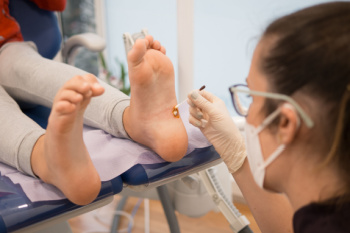
Viral and plantar warts are two foot conditions caused by the human papilloma-virus, abbreviated HPV. Viral warts, also known as common warts, typically appear as small, raised bumps with a rough texture on the surface of the skin. These warts can develop anywhere on the foot but are commonly found on pressure points like the heels or balls of the feet. Conversely, plantar warts specifically affect the soles of the feet, often appearing flat with a thickened callus-like texture and tiny black dots, known as wart seeds, within them. Both types of warts are contagious and can spread through direct contact or by walking barefoot in public areas like swimming pools or gym locker rooms. While viral and plantar warts are generally harmless and may resolve on their own over time, some cases may require specialized treatment to alleviate discomfort and prevent further spread. If you have developed warts on your foot, it is suggested that you visit a podiatrist who can effectively treat them.
Plantar warts can be very uncomfortable. If you need your feet checked, contact one of our podiatrists from Pennsylvania. Our doctors will assist you with all of your foot and ankle needs.
About Plantar Warts
Plantar warts are the result of HPV, or human papillomavirus, getting into open wounds on the feet. They are mostly found on the heels or balls of the feet.
While plantar warts are generally harmless, those experiencing excessive pain or those suffering from diabetes or a compromised immune system require immediate medical care. Plantar warts are easily diagnosed, usually through scraping off a bit of rough skin or by getting a biopsy.
Symptoms
- Lesions on the bottom of your feet, usually rough and grainy
- Hard or thick callused spots
- Wart seeds, which are small clotted blood vessels that look like little black spots
- Pain, discomfort, or tenderness of your feet when walking or standing
Treatment
- Freezing
- Electric tool removal
- Laser Treatment
- Topical Creams (prescription only)
- Over-the-counter medications
To help prevent developing plantar warts, avoid walking barefoot over abrasive surfaces that can cause cuts or wounds for HPV to get into. Avoiding direct contact with other warts, as well as not picking or rubbing existing warts, can help prevent the further spread of plantar warts. However, if you think you have developed plantar warts, speak to your podiatrist. He or she can diagnose the warts on your feet and recommend the appropriate treatment options.
If you have any questions please feel free to contact one of our offices located in Plymouth Meeting and Ambler, PA . We offer the newest diagnostic and treatment technologies for all your foot and ankle needs.
